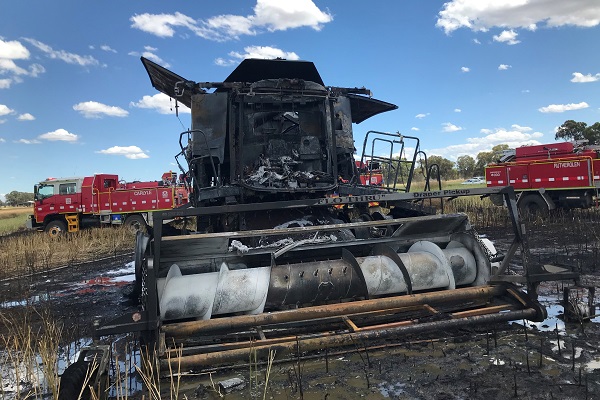
Following the warmer, drier conditions experienced in spring, CFA is warning farmers to take care with their upcoming harvesting activities.
Hot and dry conditions paired with high fuel loads will see this year's agricultural events kicking off sooner with elevated risks of fire ignition and spread.
CFA Chief Officer Jason Heffernan is reminding farmers and community members to take extra caution this harvest season and be responsive to imminent dangers.
“We are entering a more standard summer fire season this year, so we know there will be a large amount of dry fine fuel ready to burn as the vegetation continues to dry out,” CO Heffernan said.
“Unfortunately, we encounter a large number of fires igniting from farm machinery and vehicles each year in Victoria, and last year was no different which saw CFA volunteers respond to 41 of them between 1 July 2022 and 30 June 2023,” CO Heffernan said.
“Many of our volunteers are farmers themselves so we understand the pressure that harvesting-related fires pose to them and the community in regard to both their safety and profits.”
CO Heffernan said awareness is key to avoiding harvester fires, ensuring farmers are cleaning-down and inspecting equipment thoroughly before use.
“We know how quickly small fires can spread to nearby paddocks, so it is imperative that our farmers are prepared before jumping on the harvest,” he said.
“Make it part of your routine to make sure your machinery is free of faults and mechanical defects, check for straw or grass build-up, as well as hot bearings.
“It is important to understand that material collecting on hot engine components in the manifold, exhaust and turbocharger are the most common causes of harvester fires.”
Farmers are particularly warned to be mindful of harvesting, grinding, welding, slashing or mowing in hot and windy conditions, as they can cause harm in a matter of minutes.
“Be sure to check weather conditions against the Grain Harvesting Operations Guide before harvesting,” he said.
“Hot and dry conditions are a particular concern for CFA, so always carry a water fire extinguisher and postpone paddock work during the highest fire-risk periods.”
“Where possible, take regular breaks when operating machinery so it doesn’t get too hot and have adequate firefighting resources available in paddocks where you are conducting harvesting.
“We also strongly recommend you avoid driving vehicles and motorbikes through dry grass as the hot exhaust system is a major fire risk.”
Farmers are often the first responders to grass fires and understand the risks of operating machinery in these conditions, however we advise this awareness is communicated more broadly to your family and neighbours.
“Being fire safe on your farm should be part of any fire plan you have.” he said.
Crop and Farm Machinery Fire Safety
- The most common cause of harvester fires is material collecting on hot engine components such as the manifold, exhaust and turbocharger.
- Make it part of your routine to check for straw or grass build-up, and hot bearings.
- Make sure your machinery is free of faults and mechanical defects and carrying a water fire extinguisher.
- Postpone paddock work during the highest fire-risk periods. On hot, dry days, exercise extreme caution before harvesting, grinding, welding, slashing or mowing.
- The key to avoiding harvester fires is diligence in maintenance such as clean-down and inspection.
- During paddock operations have the appropriate firefighting equipment in place. You’re required by law to have a 9-litre water pressured extinguisher on hand.
- Avoid driving vehicles and motorbikes through dry grass or crop - the risk from the hot exhaust system is high.
- More information here.